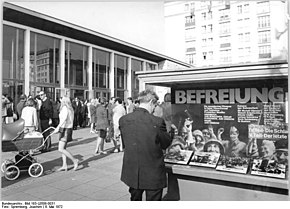Liberation (film)
Liberation ( Russian Освобождение , Oswoboschdenije ) is a five-part feature film by Juri Oserow and Julius Kun from 1969 about the liberation of the Soviet Union in World War II . The plot begins in the summer of 1943 and ends with the capture of Berlin by the Red Army in 1945 .
The film was made as a co-production between the Soviet Union, the GDR , Poland and Italy . Each of the five-part film is a feature length.
action
Part 1: The Arc of Fire
“ Operation Citadel ”, which on July 12, 1943 , leads to the largest tank battle of the Second World War on Kursker Bogen.
Part 2: the breakthrough
July 1943: Mussolini is overthrown as "Duce", but freed on September 12 by Otto Skorzeny on the Gran Sasso . German troops march into Italy and occupy Rome. Soviet offensive towards the Dnieper . Liberation of Kiev . Tehran Conference (November 28, 1943).
Part 3: The main thrust
Stalin orders Zhukov and Rokossovsky to launch the " Bagration " attack , D-Day . Vitebsk , Bobruisk and Minsk are liberated. The assassination attempt on July 20, 1944 failed. Invasion of Poland.
Part 4: The battle for Berlin
Bridgehead at Küstrin . Seelower heights . Berlin is included.
Part 5: The Last Storm
Battle of Berlin : house-to-house fighting, zoo , Brandenburg Gate , underground tunnels and Reich Chancellery as a front section. Hitler's suicide. Soviet flag on the Reichstag .
publication
The first two parts alone reached 56 million viewers in the Soviet Union. The third part had 35.8 million visitors. Parts 4 and 5 only reached 28 million viewers. Liberation was sold to 115 countries, according to official statistics, and had 400 million visitors worldwide.
In the GDR, "over 4,000,000 visitors" saw the first two parts until the premiere of the third part in June 1971. Shortly before the start of the last parts in May 1972, Liberation already had a total of 6,500,000 viewers.
This film was re-marketed and released on DVD by Icestorm Entertainment in 2006 . At the DVD premiere, the film was broadcast as a complete work on the big screen in Berlin's Urania , moderated by contemporary witnesses.
reception
The first two parts were presented in 1969 during the 6th Moscow Film Festival. In 1971, Soviet viewers voted him the best film in a survey by the magazine Sowjetski Ekran , and in 1972 he received the Lenin Prize and the main prize at the All Union Film Festival in Tbilisi .
Reviews
- Part 1 and 2
"Equipped with elaborate reconstructions and aimless historical excursions, the film does not offer a critical analysis, but a superficial war spectacle."
- part 3
"A film that is primarily oriented towards the work of the Soviet High Command and strives for historical accuracy."
- Part 4 and 5
"Although more naive than the previous films, a clear distinction is made between the German people and their fascist regime."
DVD from 1999
DVD No. 6 of the six-part DVD edition by ICESTORM Entertainment GmbH (licensor: PROGRESS Filmverleih GmbH and DEFA Foundation ) contains 191 minutes of film material on the topic:
- In a 75-minute interview, the historian Wolfgang Leonhard investigates the question of why Stalin was surprised by Hitler on June 22, 1941 and compares Stalin's clever with Hitler's stubborn tactics throughout the war .
- In a fifteen-minute statement, the military historian Jürgen Angelow brings up the partially incomplete view of the events of the filmmakers from 1969: Stalin is presented as a good-natured, level-headed ruler who also gives in. Hitler Youths who shot at Soviet soldiers in Berlin in April / May 1945 were sent home to mothers in the film after a warning. Meanwhile, half of the children would actually have disappeared in Siberia, never to be seen again . The fraternization of Soviet soldiers with Berlin civilians is shown, but the rape of numerous German women is not.
- In a fifteen-minute contribution, the Slavist Norbert Franz refers to the filmmakers' documentary efforts, finds words for Yuri Oserow's courage to touch upon accessible historical truths back in the late 1960s, and briefly compares Oserov's performance with that of other war filmmakers.
Individual evidence
- ^ Photo incorrectly filed in the Federal Archives under Kino International ; see also Kino Kosmos .
- ↑ Sergei Kudryavtsev. Swoje cinema . Dubl-D, 1998. OCLC 42657018. p. 375.
- ↑ Fëdor Rasakov. Gibelʹ sovetskogo cinema . Exmo, 2008. ISBN 978-5-699-26846-7 . P. 183.
- ↑ NM Sumenov, O. Sulʹkin. Yuri Oserov . Isskustwo, 1986. OCLC 15486357. p. 96.
- ↑ Ilse Heller, Hans-Thomas Krause. Cultural cooperation, GDR-USSR in the 1970s . Staatsverlag der DDR, 1979. OCLC 123205791. S. 58.
- ↑ On May 8th: Festive premiere of “Liberation” . New Germany , May 5, 1972.
- ↑ Liberation 1st + 2nd part: The arc of fire / The breakthrough. In: Lexicon of International Films . Film service , accessed July 29, 2017 .
- ↑ Liberation 3rd part: The main thrust. In: Lexicon of International Films . Film service , accessed July 29, 2017 .
- ↑ Liberation 4th + 5th part: The battle for Berlin / The last storm. In: Lexicon of International Films . Film service , accessed July 29, 2017 .
annotation
- ↑ The text version of the interview that Paul Werner Wagner conducted in the Steigenberger Hotel Rostock with Wolfgang Leonhard is contained as a PDF text on the DVD mentioned, in addition to the TV film, in a computer-readable format.
literature
- B. Polewoi, K. Simonow, M. Trachman, NG Pawlenko: Освобождение , Progress Moscow Publishing House, 1974.
Web links
- Parts 1 , 2 , 3 , 4 and 5 in the Internet Movie Database (English)
- Review ( memento of March 11, 2012 in the Internet Archive ) on zeitgeschichte-online.de (PDF; 143 kB)
